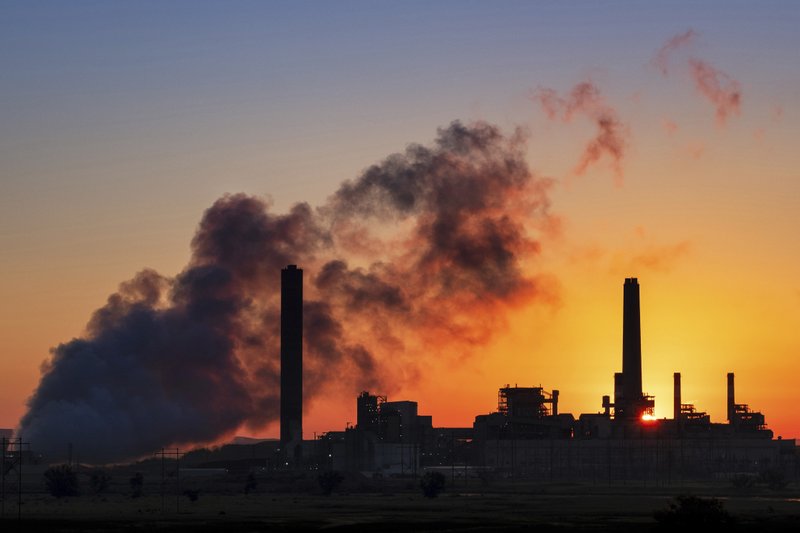WASHINGTON -- The Trump administration accelerated the pace of its environmental rollbacks for the country's coal-fired power plants Monday, proposing to weaken two Obama administration rules aimed at cleaning up dangerous heavy metals and ash from coal plants and keeping them from washing into groundwater and waterways.
The new proposals -- the latest in a series of regulatory breaks granted by the administration for the sagging U.S. coal industry and for electric utilities using coal-fired power plants -- reduces "heavy burdens on electricity producers across the country," EPA Administrator Andrew Wheeler said in a statement.
One of the two proposals released by Wheeler on Monday would relax some 2015 requirements on coal-fired power plants for cleaning coal ash and toxic heavy metals -- including mercury, arsenic and selenium -- from plant wastewater before dumping it into waterways.
The other would give some utilities up to several years more to clean up or close the more than 400 unlined coal ash dumps around the country that lie within a few feet of groundwater.
The rewrite serves to "insert a grab bag of loopholes into what had been a strong national set of health protections," said Thomas Cmar, attorney for the coal program of the environmental advocacy group Earthjustice.
It's "allowing the power industry to continue dumping toxic contaminants in our waterways at the expense of public health," Cmar said.
President Donald Trump has embraced a series of regulatory breaks and boosts sought by the coal and utility industries, including overturning U.S. support of the Paris climate accord and scrapping a legacy Obama administration climate program aimed at pushing dirtier-burning coal plants out of the country's electrical grid.
But coal production in the U.S. has continued falling amid a boom for natural gas and some renewable energy, and U.S. coal facilities are closing despite the proposed regulatory relief. Coal magnate Robert Murray, an influential Trump donor and fundraiser who had presented the new administration with a written "action plan" of desired breaks for the coal industry, sought bankruptcy protection for his Murray Energy last week.
Four of Arkansas' five coal-fired electrical plants have coal ash waste sites with levels of various pollutants that are too high, according to a report by an environmental watchdog group released earlier this year.
Coal ash ponds at 241 of 256 tested coal-fired plants nationwide -- 91 percent -- had at least one substance that was at an unsafe level, per the Environmental Integrity Project.
The groundwater near the Entergy Arkansas-run White Bluff coal-fired plant near Redfield had the most exceedances in the state. It had excessive lithium, cobalt, molybedenum, beryllium, boron and sulfate, according to the report. The groundwater near the Entergy Arkansas-owned Independence plant near Newark had excessive boron.
Utilities disputed the group's findings that coal plants were contributing to the excess chemicals, noting that the data used in the report came only from initial data collection recently required, not from continuous monitoring.
On Monday, Sierra Club of Arkansas Executive Director Glen Hooks criticized the Trump administration's actions, contending that they posed a risk to the state's drinking water.
Most Arkansans' drinking water comes from surface water sources, although groundwater wells exist in the counties that have coal-fired plants, according to information from the Arkansas Department of Health.
The Trump EPA says the relaxed wastewater rule will save $175 million annually in compliance costs. It contends that discharge of toxic contaminants into rivers, streams and creeks and ponds would actually go down, owing to what it says will be increased, voluntary wastewater cleanups by utilities. Conservation advocates and EPA regulators from the time of President Barack Obama call that claim unproven and unlikely.
Wheeler said his agency was releasing two proposed coal regulatory rollbacks in one day "to provide more certainty to the American public."
"These proposed revisions support the Trump Administration's commitment to responsible, reasonable regulations by taking a commonsense approach, which also protects public health and the environment," Wheeler said.
Other administration coal proposals include easing restrictions on smokestack releases of toxic mercury and on handling of coal plant waste ash.
"In order to keep these plants alive they are literally gutting air and water quality protections for everyone in this country," said Betsy Southerland, a science director in the EPA's water office, who retired in 2017.
"In the end I think it will only add a few years to the lives of these plants," Southerland said.
The administration plans a 60-day period for public comment on the two rule rewrites.
Information for this article was contributed by Emily Walkenhorst of the Arkansas Democrat-Gazette.
Business on 11/05/2019
